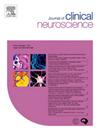多发性硬化症患者血清炎症和氧化应激标志物水平与认知预后的关系系统回顾。
IF 1.9
4区 医学
Q3 CLINICAL NEUROLOGY
引用次数: 0
摘要
背景:多发性硬化症(MS)是一种以认知障碍为重要表现的免疫介导性疾病。氧化应激和炎症在该病的发病机制中起重要作用。本系统综述探讨了炎症和氧化应激标志物与多发性硬化症患者认知结果之间的关系。方法:本研究遵循Joanna Briggs Institute (JBI)和PRISMA 2020方法。入选标准包括对MS患者的研究,评估血清炎症和/或氧化应激标志物,评估认知功能,并检查这些因素之间的关系。检索PubMed、Scopus、Embase和Web of Science,并使用JBI核对表评估偏倚风险。结果:在1609份确定的记录中,本系统综述纳入了10项研究。这些研究发表于2006年至2023年间,涉及629名多发性硬化症患者。目前的证据表明,TNF-α与MS患者的认知结果呈负相关(5项研究中有3项报道)。还报道了MS患者天然硫醇和总硫醇水平以及白细胞介素(IL)-17A与认知功能障碍之间的关系,以及IL-6和c反应蛋白(CRP)与认知评分之间的关系(各一项研究)。IL-10(四项研究)、谷胱甘肽过氧化物酶(GPX)、还原性谷胱甘肽(GSH)、过氧化氢酶活性(CAT)、缺血修饰白蛋白(IMA)、IL-8、IL-18和IL-2(各一项研究)未被发现与多发性硬化症的认知相关,有关干扰素γ (IFN-γ)、总抗氧化能力(TAC)和丙二醛(MDA)可能作用的证据也不确定。讨论:回顾研究结果表明氧化应激和炎症与ms认知结果之间存在复杂的关联,研究设计、参与者特征和评估方法的多样性使得本研究的结果不具有结论性,并强调了未来研究的必要性。本文章由计算机程序翻译,如有差异,请以英文原文为准。
Association of serum levels of inflammation and oxidative stress markers with cognitive outcomes in multiple sclerosis; a systematic review
Background
Multiple sclerosis (MS) is an immune-mediated disease with cognitive impairment being a crucial manifestation. Oxidative stress and inflammation play significant roles in the disease’s pathogenesis. This systematic review explores the association between inflammation and oxidative stress markers, with cognitive outcomes in MS patients.
Methods
This study adhered to the Joanna Briggs Institute (JBI) and PRISMA 2020 methods. Eligibility criteria included studies with MS patients, evaluating serum inflammation and/or oxidative stress markers, assessing cognitive function, and examining the relationship between these factors. PubMed, Scopus, Embase, and Web of Science, were searched and the risk of bias was assessed using the JBI checklists.
Results
Out of 1609 identified records, 10 studies were included in this systematic review. The studies were published between 2006 and 2023 and involved 629 MS patients. Current evidence suggests a negative correlation between TNF-α, and cognitive outcomes in MS (reported in three out of five studies). Associations between the decreased native and total thiol levels, as well as interleukin (IL)-17A with cognitive impairment, and the correlation between IL-6 and C-reactive protein (CRP) with cognitive scores in MS are also reported (one study for each). IL-10 (four studies), glutathione peroxidase (GPX), reduced glutathione (GSH), catalase activity (CAT), ischemia-modified albumin (IMA), IL-8, IL-18, and IL-2 (one study for each) did not found to be associated with cognition in MS and evidence regarding the possible role of interferon-gamma (IFN-γ), total antioxidant capacity (TAC), and malondialdehyde (MDA) is not definitive.
Discussion
The review findings suggest a complex association between oxidative stress and inflammation with cognitive outcomes in MS. Diversity in study designs, participant characteristics, and assessment methods makes the findings of this study inconclusive and highlights the need for future research.
求助全文
通过发布文献求助,成功后即可免费获取论文全文。
去求助
来源期刊

Journal of Clinical Neuroscience
医学-临床神经学
CiteScore
4.50
自引率
0.00%
发文量
402
审稿时长
40 days
期刊介绍:
This International journal, Journal of Clinical Neuroscience, publishes articles on clinical neurosurgery and neurology and the related neurosciences such as neuro-pathology, neuro-radiology, neuro-ophthalmology and neuro-physiology.
The journal has a broad International perspective, and emphasises the advances occurring in Asia, the Pacific Rim region, Europe and North America. The Journal acts as a focus for publication of major clinical and laboratory research, as well as publishing solicited manuscripts on specific subjects from experts, case reports and other information of interest to clinicians working in the clinical neurosciences.
 求助内容:
求助内容: 应助结果提醒方式:
应助结果提醒方式:


